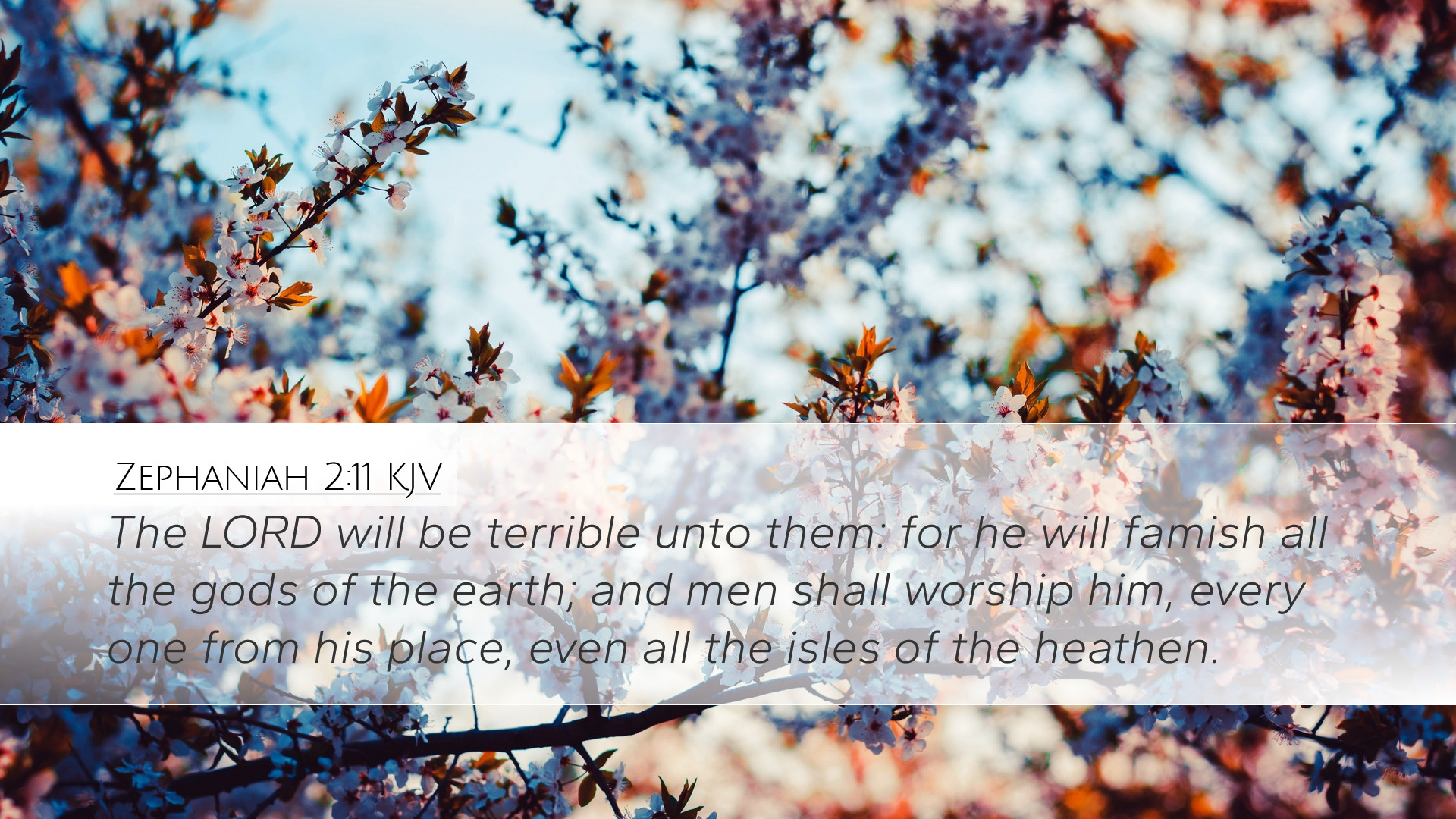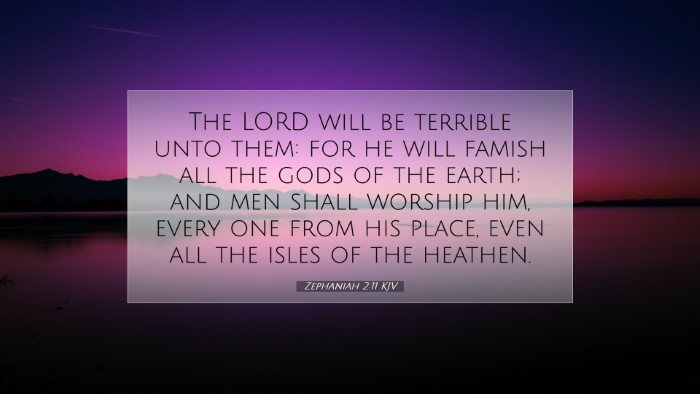Old Testament
Genesis Exodus Leviticus Numbers Deuteronomy Joshua Judges Ruth 1 Samuel 2 Samuel 1 Kings 2 Kings 1 Chronicles 2 Chronicles Ezra Nehemiah Esther Job Psalms Proverbs Ecclesiastes Song of Solomon Isaiah Jeremiah Lamentations Ezekiel Daniel Hosea Joel Amos Obadiah Jonah Micah Nahum Habakkuk Zephaniah Haggai Zechariah MalachiZephaniah 2:11
Zephaniah 2:11 KJV
The LORD will be terrible unto them: for he will famish all the gods of the earth; and men shall worship him, every one from his place, even all the isles of the heathen.
Zephaniah 2:11 Bible Commentary
Commentary on Zephaniah 2:11
Zephaniah 2:11 states, "The LORD will be terrible unto them: for he will famish all the gods of the earth; and men shall worship him, every one from his place, even all the isles of the heathen." This verse highlights the sovereignty of the Lord over the nations and the futility of idolatry. In examining this passage, we draw insights from respected public domain commentaries including those of Matthew Henry, Albert Barnes, and Adam Clarke.
General Overview
This verse is set within the broader context of Zephaniah's prophecy, which primarily concerns the impending judgment against Judah and the surrounding nations. The prophet Zephaniah is addressing both the Israelites and their neighbors, affirming that despite their transient power, all nations will eventually recognize the supremacy of the one true God. The statement about the gods being famished conveys a symbolic judgment against the false deities worshipped by heathen nations.
Insights from Matthew Henry
Matthew Henry emphasizes the majesty and authority of God. He interprets the term "terrible" as indicative of God's ability to strike fear into the hearts of those who rebel against Him. In his view, the "famishing all the gods of the earth" serves as a sign that the idols which people cling to will ultimately be rendered powerless. Henry further notes:
- The singular worship of God is inevitable: "Men shall worship him, every one from his place."
- This worship comes from a place of personal recognition and acknowledgment of God's omnipotence.
- The term "isles of the heathen" signifies distant places and peoples, indicating the global aspect of God's dominion.
Insights from Albert Barnes
Albert Barnes provides a contextual understanding of this prophecy as a proclamation against the pride of nations and their gods. He elaborates on the phrase "he will famish all the gods of the earth," indicating God's intention to show that these deities, often associated with prosperity and abundance, cannot sustain themselves nor their followers in the face of the True God. Barnes highlights:
- The judgment of God leads people to recognize their need for divine assistance as opposed to their created idols.
- The phrase "and men shall worship him" signifies a profound transformation where individuals return to the worship of Yahweh, acknowledging His ultimate authority.
Insights from Adam Clarke
Adam Clarke offers a nuanced approach, focusing on the implications of God's judgment on idolatry. He notes that God’s "terrible" nature serves both as a warning and an invitation to repentance. Clarke comments on how the phrase "and men shall worship him, every one from his place" reflects a more personal dimension of worship, suggesting that true worship does not rely on location (like Jerusalem or pagan temples) but on sincere hearts acknowledging God's supremacy:
- This verse presents a shift from communal to individual worship, implying that each person has a direct relationship with God.
- Clarke highlights the universality of God's reign, as indicated by "even all the isles of the heathen."
Theological Reflections
The implications of Zephaniah 2:11 are profound for theology, particularly in discussions on idolatry, divine sovereignty, and worship. This verse unequivocally challenges the principalities of this world, asserting that all power is ultimately subordinate to God's will. The mention of idols being famished serves as both a warning to those who might cling to material or spiritual substitutes and an encouragement to the faithful that God will prevail.
Furthermore, the invitation for all men from their own places to worship God symbolizes the inclusive nature of God's redemption plan, where every heart across the globe can turn to Him irrespective of culture or location.
Application for Ministry
For pastors and theologians, Zephaniah 2:11 offers a rich opportunity for preaching on the themes of God’s judgment and his call to true worship. The central ideas can be leveraged in several ways:
- Idolatry: Addressing contemporary forms of idolatry and encouraging congregants to identify and relinquish these in their lives.
- God's Sovereignty: Reinforce God's ultimate control and authority over all creation, fostering hope amidst chaos.
- Worship: Cultivating a personal and communal worship environment that emphasizes sincerity and the recognition of God’s holiness.
Conclusion
In conclusion, Zephaniah 2:11 serves as a powerful reminder of the Lord’s authority over all nations and the futility of false worship. The insights drawn from Matthew Henry, Albert Barnes, and Adam Clarke illuminate the verse's rich theological and practical dimensions. By engaging with this text, pastors, students, and scholars can appreciate the call to sincere worship that stands unwavering in the face of worldly temptations.


